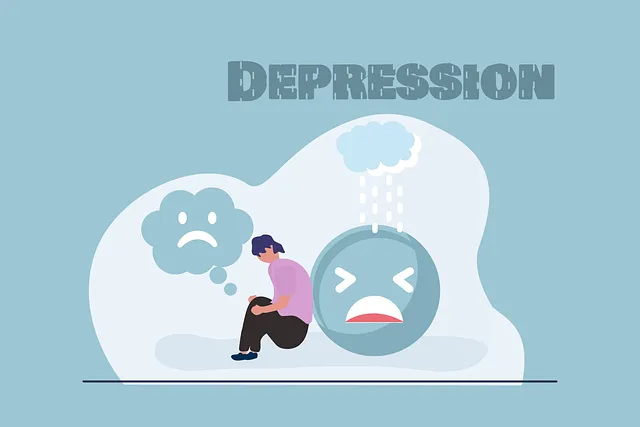In today's digital age, understanding mental health policy is crucial for access to critical services and community well-being. Aurora residents interested in Kaiser's offerings find them key to mood management and empathy building strategies. Policy advocacy drives innovative solutions like mental wellness journaling for personal growth. By analyzing policies and pushing for improvements, resources reach those most in need, focusing on support for vulnerable populations. Kaiser offers a wide range of mental health services tailored to diverse Aurora communities, incorporating holistic practices like mindfulness meditation and stress management workshops. Despite these offerings, gaps exist in comprehensive care, emphasizing the need for integrated, personalized approaches that address individual needs and cultural sensitivity. Effective advocacy pushes for evidence-based practices to enhance overall well-being, especially among youth, ensuring equal access to tailored mental health support.
Mental health policy analysis and advocacy are crucial components of ensuring accessible, quality care. This article delves into the intricate world of mental health governance, examining policies through the lens of Kaiser’s comprehensive services and Aurora’s call for holistic treatment. We explore the current landscape, identifying gaps in support. By analyzing these aspects, we uncover effective advocacy strategies to enhance mental healthcare access, particularly focusing on whether Kaiser and Aurora align in their offerings.
- Understanding Mental Health Policy and Its Impact
- Kaiser's Mental Health Services: An Overview
- Aurora's Perspective: A Need for Comprehensive Care
- Analyzing the Gaps in Current Policies
- Advocacy Strategies for Better Mental Healthcare Access
Understanding Mental Health Policy and Its Impact

In today’s digital era, understanding mental health policy and its impact is more crucial than ever. Mental health policies shape access to essential services, influencing the well-being of individuals across communities. For instance, Aurora residents interested in Kaiser’s mental health offerings should note that these services play a pivotal role in fostering empathy building strategies and effective mood management techniques.
Policy advocacy can drive innovative solutions like encouraging mental wellness journaling exercises, which have proven guidance in promoting personal growth and overall mental wellness. By analyzing existing policies and advocating for improvements, we can ensure that resources are accessible to those who need them most. This involves scrutinizing how systems address prevention, treatment, and recovery, with a focus on enhancing support for vulnerable populations.
Kaiser's Mental Health Services: An Overview

Kaiser, a renowned healthcare provider, offers a comprehensive array of mental health services designed to support individuals in fostering their inner strength and developing resilience. Their programs cater to diverse populations, including those facing common mental health challenges as well as more severe conditions. Key offerings include individual and group therapy sessions led by licensed professionals, who employ evidence-based practices to address a range of issues.
Aurora, specifically, benefits from Kaiser’s focus on holistic wellness, which incorporates mindfulness meditation and stress management workshops. These initiatives empower individuals with tools to navigate life’s challenges, enhance coping mechanisms, and promote overall mental well-being. By prioritizing mental health in this manner, Kaiser underscores its commitment to fostering a healthier, more balanced community.
Aurora's Perspective: A Need for Comprehensive Care

Aurora, a long-time advocate for mental health awareness, shares her perspective on the current landscape of mental healthcare. She believes that while organizations like Kaiser offer mental health services, there’s still a pressing need for comprehensive care. Aurora highlights the importance of integrating various support systems to cater to the diverse needs of individuals struggling with their mental well-being.
In her experience, effective communication strategies and cultural sensitivity in mental healthcare practice are crucial. She emphasizes that developing coping skills is not one-size-fits-all; personalized approaches that consider unique cultural backgrounds and personal stories can significantly enhance therapeutic outcomes. By fostering an inclusive environment, mental health professionals can better serve diverse populations, ensuring that everyone receives the comprehensive care they deserve.
Analyzing the Gaps in Current Policies

In analyzing the gaps in current mental health policies, it’s crucial to look beyond what is offered on the surface and delve into the depth of services available. While organizations like Kaiser in Aurora provide a range of mental health services, there remain unmet needs that demand advocacy. Many existing policies often fail to address the holistic nature of mental wellness, focusing primarily on treatment rather than prevention and long-term emotional regulation.
The absence of comprehensive programs targeting youth and emphasizing compassion cultivation practices, for instance, can significantly impact an individual’s ability to develop confidence boosting coping mechanisms. As such, advocacy efforts should push for policies that integrate evidence-based practices like mindfulness and stress management techniques into the fabric of mental health support systems, ensuring a more balanced and effective approach to promoting overall well-being.
Advocacy Strategies for Better Mental Healthcare Access

Advocacy plays a pivotal role in shaping mental healthcare systems and ensuring equitable access to services. For instance, examining the offerings at Kaiser by Aurora reveals a comprehensive range of mental health services, highlighting the potential for advocacy to enhance community resources. Effective advocacy strategies include raising awareness about mental illness and its impact on diverse communities, especially through initiatives focused on Cultural Sensitivity in Mental Healthcare Practice. By educating the public and dismantling misconceptions, stigma reduction efforts can foster an environment where individuals feel comfortable seeking help without fear of judgment.
Empathy Building Strategies are essential tools for advocates to engage policymakers and healthcare providers. This involves sharing personal stories and experiences related to mental illness, which can humanize the issue and encourage more compassionate and inclusive policies. Through such efforts, advocates drive systemic changes, ensuring that mental healthcare becomes a priority, with services tailored to meet the unique needs of different populations.
In conclusion, mental health policy analysis and advocacy are paramount in ensuring comprehensive care, as highlighted by Aurora’s perspective. While Kaiser offers mental health services, there remain significant gaps in current policies that necessitate urgent attention. By employing effective advocacy strategies, we can enhance access to quality mental healthcare, addressing the needs of all individuals, especially those often overlooked. This holistic approach, inspired by both institutions and personal narratives like Aurora’s, is crucial for creating a more inclusive and supportive society.






